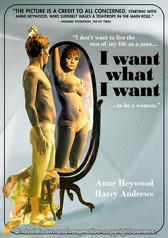 I
WANT WHAT I WANT (1972)
I
WANT WHAT I WANT (1972)Director: John Dexter
Scorpion Releasing
 I
WANT WHAT I WANT (1972)
I
WANT WHAT I WANT (1972)Anne Heywood wants to be a woman in I WANT WHAT I WANT (subtitled “To Be a Woman” on the posters and trailer narration, just in case the content of the trailer and the striking poster art didn’t clue you in), an early 1970s British screen adaptation of the Geoff Brown’s novel, out on DVD from Scorpion Releasing.
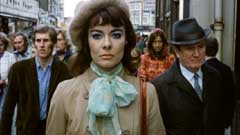
“God made man in his own image, and he blew it,” says Roy (Anne Heywood, RING OF DARKNESS) when his womanizing father (Harry Andrews, WHAT THE PEEPER SAW) catches him wearing his dead mother’s finery. Roy’s claims that he has always felt like a woman fall on deaf ears as his father decries not sending his son to boarding school after his mother’s death and then into the army. His father says he’ll spend any amount of money to get his son cured, but Roy considers becoming a woman to be his cure. After his father slaps him around a bit, Roy packs up and completely disappears. Living off the money his mother left him, Roy isolates himself in a rented room, lets his hair grow out, purchases beauty products and women’s clothing through the mail, and leaves the boarding house as Wendy Ross from Cornwall. Wendy finds an attic room in a large house owned by schoolteachers Margaret (Jill Bennett, FULL CIRCLE) and Phillip (Philip Bond). Wendy uses the excuse of her mother’s supposed recent death for keeping to herself and seldom leaving her room (even as she purchases more new clothes). Her neighbor June (Sheila Reid, BRAZIL) is the first to try to draw her out of her shell with the offer of a double date, but Wendy is still afraid of being discovered. Margaret is successful in drawing Wendy out with an invite to her Sunday brunch, but Wendy finds herself unnerved by the attentions of sports master Frank (Michael Coles, THE SATANIC RITES OF DRACULA) to which Margaret is also seemingly attracted. When Wendy’s bills pile up and she can no longer live on her small private income, she tries to get a job but cannot because they require references, employment cards and identification. Roy’s sister Shirley (Virginia Stride), initially repulsed by his change into Wendy but now more accepting (although she makes sure Wendy leaves her home before her husband gets in), cannot loan her brother the money she needs so Roy decides to seek medical help to make the full transition to Wendy. She learns that it will take up to a year of psychological evaluation before she can be approved for the operation and decides to leave the boarding house, but Frank won’t let her go without an explanation.
 The
content of I AM WHAT I AM was provocative material at the time (and may still
be), but the execution – like most British exploitation movies –
is restrained by a base level of professionalism from the cast and union crew.
As such, I’m not sure if the film’s hasty and unsatisfactory resolution
has its roots in the source material. When Margaret sees that Wendy is reading
Simone de Beauvoir’s THE SECOND SEX (the poorly translated original English
edition), she remarks “poor woman,” although one is not quite sure
whether she is referring to de Beauvoir or Wendy (de Beauvoir’s book differentiates
sex and gender, in that gender is an acquired identity). As is the norm with
mainstream classification, you’ll probably place I WANT WHAT I WANT lumped
in with other such material about gender and sex changes in “gay &
lesbian” film categories, but the story only scratches the surface of
the orientation of Roy’s sexual desire and whether it is as a man or a
woman. In her scenes as Roy, Heywood does not even remotely pass as a man (her
make-up for these scenes is less VICTOR/VICTORIA than the more recent “rich
bitch spending way too much plastic surgery”). She does convince as a
fake woman (no offense). Her gait is just slightly off, her beauty make-up is
exaggerated, and her preoccupation with clothing (she even changes dresses to
have a cup of coffee with her neighbor) suggest a greater concern with the outer
form at the expense of the inner (Shirley suggests that Roy/Wendy should not
want to look too attractive if she does not want men to get too close). Roy
claims that his mother’s death has nothing to do with his feelings, but
surely his belief that his father drove his mother to her death and his subsequent
womanizing (his father refers to all women as “stupid bitches” although
he is juggling two and relying on Roy to take part in elaborate excuses that
allow him to keep them from discovering one another).
The
content of I AM WHAT I AM was provocative material at the time (and may still
be), but the execution – like most British exploitation movies –
is restrained by a base level of professionalism from the cast and union crew.
As such, I’m not sure if the film’s hasty and unsatisfactory resolution
has its roots in the source material. When Margaret sees that Wendy is reading
Simone de Beauvoir’s THE SECOND SEX (the poorly translated original English
edition), she remarks “poor woman,” although one is not quite sure
whether she is referring to de Beauvoir or Wendy (de Beauvoir’s book differentiates
sex and gender, in that gender is an acquired identity). As is the norm with
mainstream classification, you’ll probably place I WANT WHAT I WANT lumped
in with other such material about gender and sex changes in “gay &
lesbian” film categories, but the story only scratches the surface of
the orientation of Roy’s sexual desire and whether it is as a man or a
woman. In her scenes as Roy, Heywood does not even remotely pass as a man (her
make-up for these scenes is less VICTOR/VICTORIA than the more recent “rich
bitch spending way too much plastic surgery”). She does convince as a
fake woman (no offense). Her gait is just slightly off, her beauty make-up is
exaggerated, and her preoccupation with clothing (she even changes dresses to
have a cup of coffee with her neighbor) suggest a greater concern with the outer
form at the expense of the inner (Shirley suggests that Roy/Wendy should not
want to look too attractive if she does not want men to get too close). Roy
claims that his mother’s death has nothing to do with his feelings, but
surely his belief that his father drove his mother to her death and his subsequent
womanizing (his father refers to all women as “stupid bitches” although
he is juggling two and relying on Roy to take part in elaborate excuses that
allow him to keep them from discovering one another).
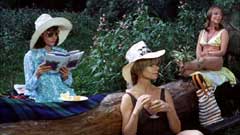
Andrews’s ex-military father character is given a little depth. He is disgusted by his son’s behavior, but grudgingly regrets his reaction. Bennett is quite a different character from Peter Cushing’s concerned – but largely peripheral to the story – wife in THE SKULL. Of the female characters in the film, Wendy is best contrasted with Margaret, who despairs of being a woman with a brain while Wendy embraces womanhood (knickers and all) and the idea of dependency on a man (even though her “frigidity” is apparent to all). Coles is good as the not-too-macho sports master intrigued by Wendy’s chilly behavior towards him, but we know how he’ll react when he discovers the truth. Stride is also a welcome presence as Roy’s accepting, but not entirely understanding sister. Reid and Bond fade into the background almost as quickly as they are introduced, having little effect on the story (even though the trailer makes it appear that June is aware of Wendy’s identity and helps her mold it, and Philip would seem to be part of a triangle with Margaret and Frank). Jill Melford (THE VENGEANCE OF SHE) plays Roy’s father’s less-than-socially-acceptable mistress.
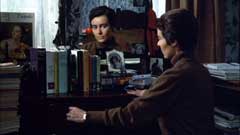 Gerry
Turpin’s cinematography is colorful, highlighting Wendy’s clothes
and make-up while artfully placing shadows and patches of light in her attic
flat. Turpin started out as a focus puller on the Ealing omnibus DEAD OF NIGHT.
His genre credits include SÉANCE ON A WET AFTERNOON, the blackly humorous
THE WRONG BOX, WHAT BECAME OF JACK AND JILL? (featuring MUMSY, NANNY, SONNY,
& GIRLY’s Vanessa Howard), THE LAST OF SHEILA and THE DOCTOR AND THE
DEVILS (his final credit). I WANT WHAT I WANT was the last of John Dexter’s
three directorial efforts, although he was credited for a couple televised stage
works during the 1980s. Producer Raymond Struss was at one time married to Heywood
and had also produced her turns in THE NIGHT FIGHERS (1960), Freddie Francis’
THE BRAIN (1962), Cyril Frankel’s THE VERY EDGE (1963), NINETY DEGREES
IN THE SHADE (1965), Mark Rydell’s screen version of D.H. Lawrence’s
THE FOX (1967), THE MIDAS RUN (1969) and Martin J. Chomsky’s GOOD LUCK,
MISS WYCKOFF (1979). I have not read the original novel so I cannot comment
on the fidelity of Gillian Freeman’s script to the source material (Freeman
also scripted Sidney J. Furie’s THE LEATHER BOYS, produced by Struss,
as well as Marianne Faithful’s monologues in GIRL ON A MOTORCYCLE).
Gerry
Turpin’s cinematography is colorful, highlighting Wendy’s clothes
and make-up while artfully placing shadows and patches of light in her attic
flat. Turpin started out as a focus puller on the Ealing omnibus DEAD OF NIGHT.
His genre credits include SÉANCE ON A WET AFTERNOON, the blackly humorous
THE WRONG BOX, WHAT BECAME OF JACK AND JILL? (featuring MUMSY, NANNY, SONNY,
& GIRLY’s Vanessa Howard), THE LAST OF SHEILA and THE DOCTOR AND THE
DEVILS (his final credit). I WANT WHAT I WANT was the last of John Dexter’s
three directorial efforts, although he was credited for a couple televised stage
works during the 1980s. Producer Raymond Struss was at one time married to Heywood
and had also produced her turns in THE NIGHT FIGHERS (1960), Freddie Francis’
THE BRAIN (1962), Cyril Frankel’s THE VERY EDGE (1963), NINETY DEGREES
IN THE SHADE (1965), Mark Rydell’s screen version of D.H. Lawrence’s
THE FOX (1967), THE MIDAS RUN (1969) and Martin J. Chomsky’s GOOD LUCK,
MISS WYCKOFF (1979). I have not read the original novel so I cannot comment
on the fidelity of Gillian Freeman’s script to the source material (Freeman
also scripted Sidney J. Furie’s THE LEATHER BOYS, produced by Struss,
as well as Marianne Faithful’s monologues in GIRL ON A MOTORCYCLE).
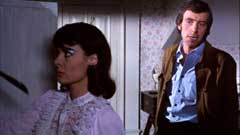
Scorpion’s transfer represents Cinerama Releasing’s 91 minute version of the film (the X-Certificate BBFC submission was 105 minutes and 7 seconds). A few actors and characters credited at Imdb never materialize in the U.S. version (I’m assuming most of this footage was in the first reel since one of the actors who does not show up is Liza Goddard as Roy’s father’s other mistress Carole). Scorpion’s progressive, anamorphic, single-layer image is very clean with the usual scratchiness around the reel change points (and one frame tear in the first shot of Anthony Sharp during a dinner party early on). Cinerama’s lab techs may have adjusted the aspect ratio slightly from 1.85:1 to 1.78:1 since the title card and some of the more crowded cards during the opening titles are letterboxed at a wider ratio than the rest of the sequence and the rest of the feature. The mono audio is in good condition, clearly rendering the dialogue and the great 1960s-sounding score by Johnny Harris (THE EVIL).
The sole contextual extra for I WANT WHAT I WANT is the Spanish theatrical trailer [2:40] (even the Spanish narrator tags on the “To Be a Woman” parenthetical in Spanish). Oddly, while the narration and all onscreen text is in Spanish (including the title QUIERO LO QUE QUIERO), the dialogue in the trailer is in English with Spanish subtitles (I wonder if the Spanish release was in English with Spanish subtitles, or if the Spanish distributors were given a pre-cut textless trailer that they could augment). Trailers for SEXTETTE, GIRLY, GOODBYE GEMINI and VOYAGER (HOMO FABER) round out the extras. (Eric Cotenas)